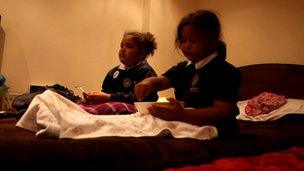Councils leaving homeless families in B&Bs too long
- Published
Thousands of homeless families are being forced to live in squalid accommodation for unlawfully long periods
More and more homeless families are being forced to live for unlawfully long periods in overcrowded and sometimes dangerous bed and breakfast hotels, BBC Newsnight has discovered.
Councils are increasingly flouting the law by keeping children in B&Bs for more than the government-imposed maximum of six weeks.
But one council investigated by the programme - Croydon, in south London - denied any unlawful behaviour and said it was working hard to get families out of B&Bs as quickly as possible.
In its investigation, Newsnight found families living in rooms barely bigger than the size of the beds they contained.

Lack of space means these girls are forced to eat, play and do homework on their bed
In some kitchens and other communal areas BBC Newsnight found damp, rodent droppings, fire hazards, and a lack of security enabling intruders to get in.
One mother, Aneta Lloyd, who for seven weeks has been living with her two daughters in a cramped Croydon hotel room, which includes a tiny kitchen area, said:
"It's been horrendous. There's loads of noise going on. There is nowhere for the children to play, to do their homework. It's inhuman."
According to the latest official figures, there were 1,660 families containing children or a pregnant woman being accommodated in bed and breakfast hotels at the end of March 2012 - more than double the number in 2010.
At the end of 2011, the number of families living in such emergency accommodation for more than six weeks was 427, prompting the then housing minister, Grant Shapps, at the time to warn some local authorities that they were breaking the rules.
But since then the situation has worsened. Barking and Dagenham, the council which topped the offenders' list at the end of last year, with 37 families in B&Bs for more than six weeks in December 2011, now has 83.
Croydon now has 180 such cases - accounting for most of the families in B&B accommodation in the borough.
This is an extraordinary jump from last year, when Croydon recorded that it had no families in such circumstances - though Newsnight has evidence of several families who spent months in B&B accommodation provided by Croydon in 2011 - which suggests that official figures may hide the true scale of the problem.
Housing stock squeeze
Jane Pritchard, a housing lawyer, is now threatening to take Croydon to court to try to force it to move long-stay families out of B&Bs:
"The law provides that when you are in B&B as a homeless applicant and you have children with you or you are pregnant, the council should not provide you with B&B unless it's in exceptional circumstances and even then for a maximum of six weeks.
"So the minute Croydon Council put someone in a B&B and are not positively looking for an alternative for them, they are acting unlawfully" she said.
But the council's chief executive, Jon Rouse, rejected the accusation:
"We are concerned. But we are behaving legally. We review all cases on an ongoing basis and clearly as we're coming up to that six week threshold, we're particularly concerned to see if we can identify alternatives for those individual households."
Like many other local authorities Croydon says it has fewer and fewer alternatives to B&Bs for homeless families as rents rise, benefits are cut, and social housing stocks diminish.
"The problem is the lack of availability of private rental dwellings. The introduction of caps on the local housing allowance rates means less private rented stock is available to people on benefits," Mr Rouse said.
"The second problem is that people who would have moved on from the private rented sector to buy their own home, haven't done so. And so again that causes a lack of availability at the lower end of the housing ladder."
In the first seven months of this year, Croydon spent more than £1.5m on one B&B provider, EuroHotels, alone.
Rodents and fire risks
An independent environmental health inspector who visited one EuroHotel property, Gilroy Court Hotel, for Newsnight, found overcrowding, evidence of rodents, fire risks, and a category 1 statutory hazard - a damaged ground floor window through which intruders had been able to enter the house months before.
The inspector, Philip Moxon, said: "We've looked at the electrics, we've looked at the heating; we've looked at the fire precautions; we've looked at the facilities that these people have and they are totally inadequate.
"There are issues here which are in breach of the law and the sad part about it is that the local authority are putting people into property which potentially is dangerous."
The building was home to six households, each housed in one room, with a total of 17 people who shared one kitchen, three toilets and two baths.
Rules at the Gilroy Court Hotel prohibit children from playing in corridors or staircases, though there is no room for them to play in rooms.
Residents are also banned from having visitors without management permission, and from wearing pyjamas or dressing-gowns in communal areas - making going to the toilet at night difficult.
EuroHotels told the BBC their properties comply with the relevant statutory regulations, and are frequently inspected by the relevant authorities.
Croydon Council say they inspect B&Bs at least once a month, and have staff in Gilroy Court Hotel at least once a week - but promised to re-inspect immediately following the BBC investigation.
Watch Tim Whewell's report in full on Newsnight, 10.30pm on Thursday 4 October, 2012. Or catch up afterwards on BBC iPlayer.
- Published17 September 2012
- Published17 September 2012
- Published16 January 2012